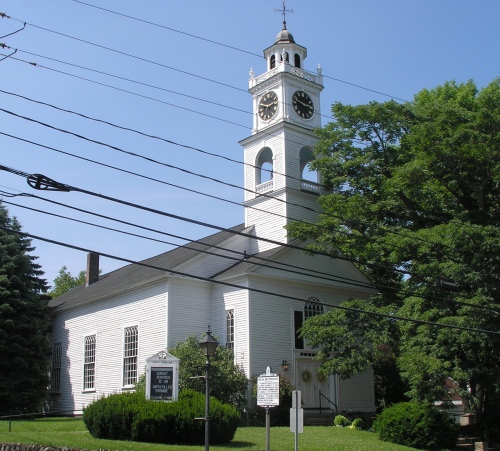Eliot Church, South Natick (1828)

This week we will be looking at buildings in South Natick. The Puritan missionary John Eliot first settled Natick in 1651. It was the first of the towns he established for settlement by the Praying Indians, who had converted to Christianity. Eliot, working with Praying Indian translators, produced an Indian grammar and the Natick Bible. The Praying Indian village was in South Natick, along the banks of the Charles River. The Indian church that Eliot established in Natick in 1651 continued under his successor, the first Native American minister, Rev. Daniel Takawambpait. The church suffered through the breakup of the Praying Indian villages during King Philip’s War. By 1699, the original meeting house had fallen into disrepair, and the remaining Christian Indians of Natick petitioned the General Court to allow them to sell a portion of their plantation to John Coller, Jr., a carpenter, in exchange for his building them a new church. This was accomplished by 1702 and Daniel Takawambpait preached in the new church until his death in 1716.
Another new meeting house was built on the same site in 1721 and in 1729 a new church society was established, consisting of both Indians and English settlers, the latter of whom were rapidly migrating into the area. But the experiment of a communal church did not last: Indian membership continued to decline and the church experienced internal conflict over theological issues and the location of the new meeting house. It was begun, on the site of its predecessors, in 1749, but not finished until until 1767. This occurred during the tenure of Rev. Stephen Badger, last missionary to the Natick Praying Indians, whom many English-descended residents refused to accept as their minister. After Rev. Badger’s retirement in 1799 and death in 1803, the South Natick church was abandoned and in 1802, a new First Congregational Church was organized to the north, in what is now the center of Natick. In 1828, the South Parish Congregational Church was organized and built a church on the site of the four earlier Praying Indian meeting houses. The church became Unitarian in 1870, under the ministry of Rev. Horatio Alger, Sr. The building’s clock was installed in 1872 and the vestry was added in 1880. In 1944, the Unitarian church joined with the John Eliot Congregational Church, both of which had been experiencing financial difficulties, and the two churches used the Unitarian meeting house for worship. The congregations merged in 1990, becoming the united Eliot Church of South Natick.
I was the music director of your church in the late 1970s. The church and surroundings were beautiful, the members gracious, and the only downside for me was the ill natured Reverend, Thomas Payne.